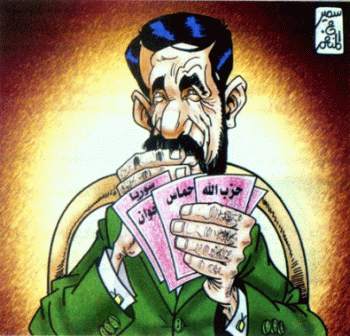
Secretary of State Hillary Clinton visits the grave of former
Lebanese Prime Minister Rafik al-Hariri during a visit to the
country on Apr. 26. U.S. allies there are leery of the Obama
Administration's plans for the region.
L'Orient Le Jour,
Lebanon
'Deliver Me, O
My Lord, from My Friends' [Americans]
"How is Obama
going to handle the issue of the Middle East - powder keg of the world? … As the weakest link in the chain, Lebanon
is concerned, afraid of falling victim once again, to any bazaar. Deliver me, o
my Lord, from my friends; I can take care of my enemies. Never has this saying
applied better than to Americans, now represented by Obama."
By Emile Khoury
Translated By L. McKenzie
Zeiss
April 27, 2009
Lebanon - L'Orient Le Jour - Home Page (French)
It is a question everyone is
asking, here as elsewhere: How is Obama going to handle the issue of the Middle
East - powder keg of the world? As the weakest link in the chain, Lebanon is
concerned, afraid of falling victim once again, to any bazaar [they are afraid
of getting sold out behind closed doors]. Because, to begin with, the new American
president proposes opening a dialogue with the Iranians as well as the Syrians.
This ordinarily results in haggling with just the veneer of attractive offers.
But he may come up against rejections or prohibitive
conditions which will lead to an impasse. If not from the start, as we saw with
the negative reaction of [Iran's Supreme Leader] Khamenei, then at any ensuing
moment. What will Obama do then? Would he brandish the stick in place of the
carrot, and would he use it? His predecessor certainly did that, in Afghanistan
as in Iraq, but without managing to land the decisive blow - without which the
use of force is even more damaging than it is pointless.
Deliver me, o my Lord, from my friends; I can take care of
my enemies. Never has this saying applied better than to Americans, now
represented by Obama. Indeed, Israel, organic ally of the United States, which cannot
let it go, poses a serious problem to Washington. This is especially true with
the advent of [Benyamin] Netanyahu, leader of Israel's hard right, which has
come about in one of those ironic conditions of history (or it balance?) at the
moment Obama, leader of the American center-left, has taken up residence at the
White House.
In concrete terms, like Yitzhak Shamir in Madrid
before him, Netanyahu will no doubt wish to circumvent the American proposal
that can be summed by with the formula: two adjoining states, one Palestinian
and one Israeli. For like Shamir, Netanyahu believes that the notion of peace
is limited to the security of and territorial integrity of the Jewish state.
And he also thinks that the need to guarantee security cannot coexist with the
restitution of occupied Arab territories that have strategic or logistical
importance, particularly if one thinks of water. In other words, he rejects, by
personal conviction, the U.N. resolutions of the Madrid conference, the
Quartet’s road map for peace, the Mitchell project and the Arab initiative from
the 2002 [Saudi] summit - in other words, all plans founded on the equation:
land in return for peace.
Netanyahu’s logic is based on an objective alliance with the
region’s radicals - Palestinian, Arab and Persian. These activists in effect
agree with him when he maintains that one cannot talk of peace as long as
violence, bombings or missile launchings persist. He emphasizes that Israel’s
security is still menaced on the Palestinian front by Hamas, and the border
with Lebanon by Hezbullah, despite the deployment of the Lebanese army and UNIFIL (United Nations Interim
Force in Lebanon). He argues out, moreover, that peace doesn’t make much sense
if it doesn’t bind the people and not just their governments, citing the case
of Egypt and Jordan. In short, Netanyahu accords no importance to peace when
compared to security.
Posted by WORLDMEETS.US
What, then, can Obama do? Like Carter, Clinton and both
Bushes, he supports the logic of moderate Arabs: the security that Israel
demands can only come as the fruit of a just and overall peace, as the facts
amply demonstrate. Once such an agreement is reached, meaning that each side
recovers its territorial and national rights, violence will drop on its own.
Once liberation has been achieved, the Palestinian and Hezbullah factions will
no longer have reason to operate and keep their arsenals.
Otherwise, and because Israel complains so much of Iran,
Tehran could, within the framework of its own regional goals, continue to arm
and finance Hezbullah and Hamas - via Syria, which is perhaps less concerned
with recovering the Golan Heights than it is Lebanon, by the March 8 proxy [the
'March 8 proxy' refers to people that represent Syria's interests in Lebanon,
particularly forces aligned with Hezbullah, who held a mass demonstration in
favor of Syria on March 8, 2005, just after the assassination of Lebanese Prime Minister Rafik Hariri].

'Iran's regional cards: Syria, the Muslim Brotherhood,
Hezbullah and Hamas.'
[Nahdat Masr, Egypt]
Obama’s dilemma is simple but powerful. If he fails to
convince Netanyahu, he will have to give in to him in an attempt to fully
securitize the region as an introduction to peace. This is a mission impossible
- even if his overtures to Iran and Syria lead to positive results. For neither
Hezbullah nor Hamas - let alone other groups like al-Qaeda - obey anyone at finger and eye [to be at someone's
beck and call] when their own cause is at stake.
CLICK HERE FOR
FRENCH VERSION
[Posted by WORLDMEETS.US April 28, 2:53pm]